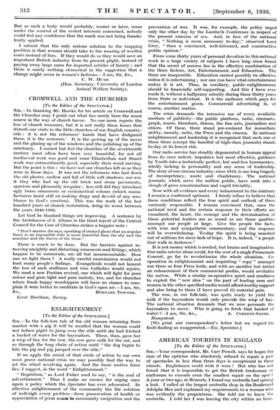ENLIGHTENMENT
[To the Editor of the SPECTATOR.] SIR,—In the folk-lore tale of the old woman returning from market with a pig it will be recalled that the woman could not induce piglet to jump over the stile until she had fetched a bucket of water for the haymakers. These, then, gave her a wisp of hay for the cow, the cow gave milk for the cat, and so through the long chain of action until "the dog began to bite the pig and pig jumped over the stile."
If we apply the moral of that circle of action to our own most grave national crisis we may possibly find the way to set the wheel revolving again. And the basic motive force lies, I suggest, in the word "Enlightenment."
"Repetition," as Lord Fisher used to say, "is the soul of advertisement." Thus I make no excuse for urging once again a policy which the Spectator has ever advocated. In effective enlightenment of the community lies the solution of well-nigh every problem—from preservation of health or appreciation of great music to community emigration and the prevention of war. It was, for example, the policy urged only the other day by the Lambeth Conference in respect of the present miasma of sex. And, in face of the national crisis, "Nothing is more necessary to-day," observed Lord Grey, "than a convinced, well-informed, and constructive public opinion."
From some thirty years of personal devotion to this national work in a large variety of subjects I have long since found that the secret of success lies in the effective combination of the three factors, Art, Entertainment, and Education. The three are inseparable. Education cannot possibly be effective unless it is entertaining ; nor can you have vital entertainment unless it is art. Thus, in corollary, public enlightenment should be financially self-supporting. And this I have ever made it, without a halfpenny subsidy during those thirty years from State or individual. It is the audience which pays for the entertainment given. Commercial advertising is, of course, another matter.
The crisis demands the intensive use of every available medium of publicity—the public platform, radio, cinemato- graph, music, literature, drama, the fine arts, journalism and others. Of these, three stand pre-eminent for immediate utility, namely, radio, the Press and the cinema. In national enlightenment and leadership it is recognized that each one of these three (except the handful of high-class journals) stands to-day at its lowest ebb.
Our radio service has steadily degenerated in human appeal from its once ardent, impulsive but most effective, guidance by Youth into a technically perfect, but soul-less bureaucracy, wholly lacking in personality and any sense of leadership. The story of our cinema industry, since 1918, is one long tragedy of incompetency, waste and charlatanry. The national journals, which serve the million public, have sunk into a slough of gross sensationalism and vapid triviality.
Now with all evidence and every inducement to the contrary I remain a confirmed optimist. I firmly refuse to believe that these conditions reflect the true spirit and outlook of those variously responsible. I remain convinced that, once the national need and the certain response to their efforts are visualized, the heart, the courage and the determination of those potential leaders are as sound as are those qualities amongst our people at large. Give the people the facts, with wise and sympathetic commentary, and the response Will be overwhelming. To-day the spirit is being smashed out of millions for sheer lack of hope. It is, indeed, "a people that walk in darkness."
It is not money which is needed, but brains and imagination. Our radio service alone could, for the cost of a single Promenade Concert, go far to revolutionize the whole situation. Co- operation in enlightenment and inspiriting " copy" amongst our three or four Press lords, and with no sacrifice but rather an enhancement of their commercial profits, would revitalize the nation. While a similar co-operative spirit and readiness to exploit the "new idea" on the part of leading men and women in the other specified media woulcLafford worthy support and also bring to them (I have proved it) material gain.
The cow, in our folk-tale, was quite ready to yield the milk if the haymakers would only provide the wisp of hay. The national situation demands that we now persuade the haymakers to move. Who is going to fetch that bucket of water ?—I am, Sir, &c., A. CORBETT-Sminr. Hampstead.
[We print our correspondent's letter but we regard his fault-finding as exaggerated.—En. Spectator.]






























 Previous page
Previous page